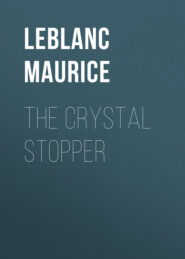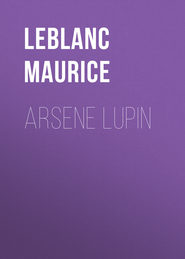По всем вопросам обращайтесь на: info@litportal.ru
(©) 2003-2024.
✖
The Eight Strokes of the Clock
Настройки чтения
Размер шрифта
Высота строк
Поля
Rénine, without a moment's hesitation, had picked up the paper. After casting a swift glance down the page, he read, under his breath:
"Maître Dourdens, the counsel for the defence in the trial of Jacques Aubrieux, has been received at the Élysée. We are informed that the President of the Republic has refused to reprieve the condemned man and that the execution will take place to-morrow morning."
After crossing the terrace, the young man found himself faced, at the entrance to the garden, by a lady and gentleman who blocked his way; and the latter said:
"Excuse me, sir, but I noticed your agitation. It's about Jacques Aubrieux, isn't it?"
"Yes, yes, Jacques Aubrieux," the young man stammered. "Jacques, the friend of my childhood. I'm hurrying to see his wife. She must be beside herself with grief."
"Can I offer you my assistance? I am Prince Rénine. This lady and I would be happy to call on Madame Aubrieux and to place our services at her disposal."
The young man, upset by the news which he had read, seemed not to understand. He introduced himself awkwardly:
"My name is Dutreuil, Gaston Dutreuil."
Rénine beckoned to his chauffeur, who was waiting at some little distance, and pushed Gaston Dutreuil into the car, asking:
"What address? Where does Madame Aubrieux live?"
"23 bis, Avenue du Roule."
After helping Hortense in, Rénine repeated the address to the chauffeur and, as soon as they drove off, tried to question Gaston Dutreuil:
"I know very little of the case," he said. "Tell it to me as briefly as you can. Jacques Aubrieux killed one of his near relations, didn't he?"
"He is innocent, sir," replied the young man, who seemed incapable of giving the least explanation. "Innocent, I swear it. I've been Jacques' friend for twenty years … He is innocent … and it would be monstrous...."
There was nothing to be got out of him. Besides, it was only a short drive. They entered Neuilly through the Porte des Sablons and, two minutes later, stopped before a long, narrow passage between high walls which led them to a small, one-storeyed house.
Gaston Dutreuil rang.
"Madame is in the drawing-room, with her mother," said the maid who opened the door.
"I'll go in to the ladies," he said, taking Rénine and Hortense with him.
It was a fair-sized, prettily-furnished room, which, in ordinary times, must have been used also as a study. Two women sat weeping, one of whom, elderly and grey-haired, came up to Gaston Dutreuil. He explained the reason for Rénine's presence and she at once cried, amid her sobs:
"My daughter's husband is innocent, sir. Jacques? A better man never lived. He was so good-hearted! Murder his cousin? But he worshipped his cousin! I swear that he's not guilty, sir! And they are going to commit the infamy of putting him to death? Oh, sir, it will kill my daughter!"
Rénine realized that all these people had been living for months under the obsession of that innocence and in the certainty that an innocent man could never be executed. The news of the execution, which was now inevitable, was driving them mad.
He went up to a poor creature bent in two whose face, a quite young face, framed in pretty, flaxen hair, was convulsed with desperate grief. Hortense, who had already taken a seat beside her, gently drew her head against her shoulder. Rénine said to her:
"Madame, I do not know what I can do for you. But I give you my word of honour that, if any one in this world can be of use to you, it is myself. I therefore implore you to answer my questions as though the clear and definite wording of your replies were able to alter the aspect of things and as though you wished to make me share your opinion of Jacques Aubrieux. For he is innocent, is he not?"
"Oh, sir, indeed he is!" she exclaimed; and the woman's whole soul was in the words.
"You are certain of it. But you were unable to communicate your certainty to the court. Well, you must now compel me to share it. I am not asking you to go into details and to live again through the hideous torment which you have suffered, but merely to answer certain questions. Will you do this?"
"I will."
Rénine's influence over her was complete. With a few sentences Rénine had succeeded in subduing her and inspiring her with the will to obey. And once more Hortense realized all the man's power, authority and persuasion.
"What was your husband?" he asked, after begging the mother and Gaston Dutreuil to preserve absolute silence.
"An insurance-broker."
"Lucky in business?"
"Until last year, yes."
"So there have been financial difficulties during the past few months?"
"Yes."
"And the murder was committed when?"
"Last March, on a Sunday."
"Who was the victim?"
"A distant cousin, M. Guillaume, who lived at Suresnes."
"What was the sum stolen?"
"Sixty thousand-franc notes, which this cousin had received the day before, in payment of a long-outstanding debt."
"Did your husband know that?"
"Yes. His cousin told him of it on the Sunday, in the course of a conversation on the telephone, and Jacques insisted that his cousin ought not to keep so large a sum in the house and that he ought to pay it into a bank next day."
"Was this in the morning?"
"At one o'clock in the afternoon. Jacques was to have gone to M. Guillaume on his motor-cycle. But he felt tired and told him that he would not go out. So he remained here all day."
"Alone?"
"Yes. The two servants were out. I went to the Cinéma des Ternes with my mother and our friend Dutreuil. In the evening, we learnt that M. Guillaume had been murdered. Next morning, Jacques was arrested."
"On what evidence?"
The poor creature hesitated to reply: the evidence of guilt had evidently been overwhelming. Then, obeying a sign from Rénine, she answered without a pause:
"The murderer went to Suresnes on a motorcycle and the tracks discovered were those of my husband's machine. They found a handkerchief with my husband's initials; and the revolver which was used belonged to him. Lastly, one of our neighbours maintains that he saw my husband go out on his bicycle at three o'clock and another that he saw him come in at half-past four. The murder was committed at four o'clock."
"And what does Jacques Aubrieux say in his defence?"
"He declares that he slept all the afternoon. During that time, some one came who managed to unlock the cycle-shed and take the motor-cycle to go to Suresnes. As for the handkerchief and the revolver, they were in the tool-bag. There would be nothing surprising in the murderer's using them."











